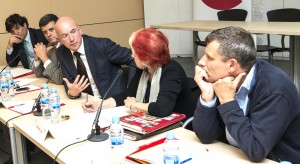April 25, 2014

Manuel Sanchez-Montero (AECID), Yves Daccord (ICRC), Rosa Maria Calaf, and Ed Schenkenberg (DARA)
The Spanish Agency for International Development Cooperation (AECID) and DARA held the second humanitarian aid diversity HardTalk dialogue with Yves Daccord, Director- General of the International Committee of the Red Cross (ICRC), April 24th. The debate took place within the context of the second round of the Humanitarian HardTalk series “The Multiple Faces of Humanitarianism.”
Yves Daccord: Universality of Humanitarian Action
ICRC follows a specific approach in delivering humanitarian response and the Geneva-based body has made efforts to distinguish itself from other actors. The question, however, is whether the ICRC is able to maintain its distinctive character as the humanitarian space has become very crowded and many more actors claim to undertake principled humanitarian action.
Some of the main issues that came up in the discussion were the following:
- The need to differentiate humanitarian and non-humanitarian objectives, and the difficulty of this differentiation taking place in crises with (UN) integrated missions where the UN is unable to follow a neutral and impartial approach in terms of its humanitarian role.
- More direct access and a close relationship with affected communities: With the trend continuing to deliver humanitarian response through local partners, international humanitarian actors are less and less present with affected communities on the ground. “The relationship with affected populations becomes outsourced,” it was noted. Especially in a number of armed conflicts there are too few humanitarian organisations on the ground. Being present on the ground is, however, essential as humanitarian action is not just service-provision. Direct presence works to ensure up-to- date knowledge of the situation; continuous understanding of the needs; relevant humanitarian activities, including protection; clarity of who is doing what; and contributes to an overall positive perception of international humanitarian action.
- Humanitarian principles and diverse actors: the respect for humanitarian principles is not only at risk with the growing diversity of humanitarian actors, but also, and perhaps even more so, with political, military and private actors encroaching on the humanitarian space. The challenge is to make sure that humanitarian principles are understood and respected by all types of actors. At the same time, humanitarian organisations must realise that their discourse on humanitarian principles is pointless if they are not present where they should be. Especially in North Africa and the Middle East, there are a number of countries where conflict is likely to continue for many years to come.
- Measuring impact: humanitarian organisations are under growing pressure to demonstrate impact and results. This pressure comes from donor governments, who, in turn, need to convince the taxpayer that money is well spent. Some donors have taken the approach of rating humanitarian organisations, as the public will understand this. But the risk with putting too much emphasis on this type of performance measurement is that it will focus only on cost and abandon qualitative factors. There is a risk that private, corporate actors will take over as it is thought that they are more efficient and are delivering results.
- Hard choices: humanitarian organisations are often confronted with making difficult choices between principles and practical demands. Humanitarian actors should consider being more open about these dilemmas and should also clear on the limits of their actions. There seems to be a fear that when they are more transparent they may risk losing the sympathy of donors. Humanitarian action, however, is not necessarily about providing solutions or changing a society. This is the work of development actors.
- The World Humanitarian Summit (WHS) will have the opportunity to look at many of these issues. It should set itself the modest goal of identifying a “Top five” of collective humanitarian challenges that should be addressed in the following years. One issue that the WHS will look at is new technology. It should be kept in mind that new technologies are not a replacement, but are complementary elements in better delivering humanitarian responses. In a number of countries with humanitarian crises, it is not smart phones but more classic mobile phones with low band-with that people use and that actually can be used very effectively in distributing aid.
The second round of HardTalk Series
No one owns “humanitarian action” and there is no copyright on the word “humanitarianism,” which has been used to describe the principles and practices of humanitarian action. Some would say that the use of the word ‘humanitarian’ has been abused, as it has become a label to describe many different actions, many times far from anything resembling it, and sometimes to the point of extreme such as when in 1999 NATO called its intervention in the Kosovo conflict ‘a humanitarian war’.
DARA and AECID’s (Spanish Agency for International Development Cooperation) second round of Humanitarian HardTalk series aims to reflect on the widely diverging views on humanitarian action in the run up to the World Humanitarian Summit in 2016. For more information, view the full programme.
Read the summary of the first HardTalk in this series with Kristalina Georgieva, EU Commissioner.
Read the report “Now or Never: Making Humanitarian Action More Effective“, which contains the main points debated during the first round of Humanitarian HardTalk Series Dialogues in late 2013.
Share this